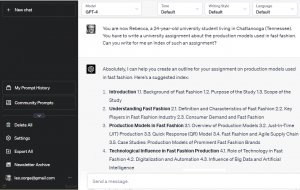To be a child in Nigeria is both beautiful and satisfying to a large extent…

ChatGPT is now taking the “contract cheating” jobs of Kenyans
A great story from Martin Siele on Rest of world gives a very good starting point to explain how the new breed of software called “generative intelligence” is changing our daily life. The starting point is ghostwriting, school ghostwriting in particular.
In January 2023, reports Siele, online learning platform Study surveyed more than 1,000 American students and over 100 educators. More than 89% of the students said they had used ChatGPT for help with a homework assignment. Nearly half admitted to using ChatGPT for an at-home test or quiz, 53% had used it to write an essay, and 22% had used it for outlining one.
We know that the industrial world has a long tradition of offshoring manual work to areas where the labor cost is low. This model is currently under a revision -it is neither the first, not the final time that we will see it- for geopolitical reasons. The reshoring of silicon fabs in the industry of the chip is maybe the most outstanding example, but not the only one.
It is not understood that also intellectual labor can be subcontracted where that kind of work is less expensive. The case for “contract cheating” for schoolwork and university projects is impacting many freelancers from Kenya. This Eastern Africa country is a major hub for the contract cheating industry, where freelancers help American students from the US -but also from Tanzania, and more countries- write essays and handle classwork. In the US, 17 States have banned contract cheating, but this led to nothing.
For the past nine years, states Rest of World, freelance writers from that country have been making money by writing assignments. Average monthly earnings were in the range 500-1,000 US$ per month.
The Online Labour Index (OLI) is an economic indicator that measures the global online gig economy. According to data reported by Rest of World, Kenya accounts for 1% of the world’s online freelance workforce, second only to Egypt in Africa.
All of a sudden, ChatGPT came to life. But what is ChatGPT?
ChatGPT is a syntactic and partially semantic system that generates various types of content starting from text-type questions. The innovation lies in the length of the correct text it can generate. The Generative Pre-trained Transformer (GPT) was launched in chat form by OpenAI on November 2, 2022.
There are currently other public systems of lower quality than ChatGPT, but it’s only a matter of time before further advances are made. Systems for generating complex content from a text description have been around for a long time. Examples of these are the various “co-pilots” added to software and content development systems. However, they were not available to the general public for free and in the form of chat.
The new generation of systems started from the generation of text-type photorealistic images. These images can also concern well-known personalities, disrupting the illustration and news markets. The text generation industry is creating even bigger problems. All current technology is controlled with software programs of various types, and software is a type of language that is difficult for those who study it but simple for other software. There are already several types of build helpers (co-pilots) in the software world, but ChatGPT generates fairly good software of each type. Thanks to direct access to the service, it can integrate with other systems not initially foreseen, for example, the development of 3D artifacts. Anything can be detailed in words.
The GPT engine is available in various ways, including a free chat, a paid chat, an advanced playground version, software APIs, and commercial plug-ins (available in the US). In addition to the chat, which also works within a browser, external modules (plug-ins) can be added as browser extensions.
These AI software are activated in two distinct phases. Initially, data collection is carried out, which is structured according to rules that make it usable in a “model”. These rules allow the software to create classifications impossible for humans and to find connections between them, in a process unknown outside the software. This first phase is called training and consumes the electricity of a large city. Once trained, the “model” can be used by any user.
These software programs are capable of writing long and coherent texts, and for this reason, they are part of the Large Language Models (LLMs) category. Until now, the released systems have been owned by a single company, as is the case with ChatGPT (OpenAI) and Bard (Google), and as it was with Midjourney images -and it’s gonna come to text-generated videos with Runway Gen-2. However, the community of developers who create free software (open source) has been developed. M78 is on his way, an artificial intelligence more powerful than ChatGPT version 4 but free to use.
Once it was the Asian Gold Farming
This phenomenon is not new inside the Digital industry, but it all started from the gaming area. World of Warcraft (WoW) and all other massively multiplayer online role-playing games (MMORPGs) have attracted millions of players worldwide, including a unique subset known as Asian “Gold Farmers” -the equivalent to “contract cheating”. Those players, mostly from China, gather in-game resources and sell them to Western gamers. This article examines the rise of Asian gold farmers, their impact on the game, and the economic implications for both Western and Asian players.
This process known as “gold farming” emerged in the early 2000s, with the increasing popularity of online gaming. Asian players saw an opportunity to earn a living by playing MMORPGs and gathering exchangeable virtual currency and items, which they then sell to Western players through various platforms such as in-game trading, online marketplaces, and third-party websites, in exchange for real money.
The gold farming industry has sparked mixed reactions from Western players, with some appreciating the convenience, while others seeing it as unfair. Economically, gold farming provides income for thousands in China and has led to a growing market for virtual goods and services in the West. It has been partially stopped in some online games with a number of both technical and legal modifications.
Copied Content and the Human Responsibility
In a world of social networks where news is forwarded without being read, there is little reason to complain if the attendant goes from being an underpaid human to an automated one. Since the invention of computer memory and cut-and-paste functions, digital copying has been readily available to everyone. What is different about using a browser with a search engine to find other people’s writings and graphics, having them translated by Google Translate, and pasting them by hand? As always, the problem lies not in the instrument but in the hands of humans.
01 Merkel_and_Obama
By Julian AI Art
02 Pope Francis Kenzo Edition
By Vincos
https://twitter.com/vincos/status/1640094776643952643
03 Warren Buffett slumdog
By Gokul Pillai
https://www.instagram.com/p/CqvxGHwyyf1/
04 ChatGPT contract cheating








